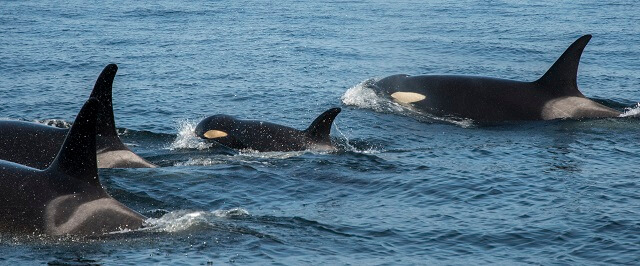Scarlet, known to scientists as J-50, was a member of the J pod, one of three extended orca families known as the Southern Resident Killer Whales, who make their home in the Salish Sea off the coast of Seattle.
Their numbers have been dwindling due to lack of their only food source, Chinook salmon, along with ever-increasing environmental pollution and boat noise. The Southern Resident orcas are now listed as an endangered population, and at the time we became involved in the effort to save Scarlet’s life, only 75 remained.

Scarlet with her family in mid-August 2018. Photo by Katy Foster/Whale Sanctuary Project under NOAA permit 18786.
In early August 2018, nearly four-year-old Scarlet was emaciated and starving, and the National Oceanic and Atmospheric Administration (NOAA) invited the Whale Sanctuary Project, along with several other organizations, to help her.
Two of our team members, Jeff Foster and Katy Laveck Foster, coordinated much of the field work that’s detailed in our reports.
Sadly, we couldn’t save Scarlet, but the effort was worthwhile, both in itself and for the future. That’s because sooner or later – probably sooner – there will be another Southern Resident orca in trouble. And when that happens, and if the team that worked together from the start of this mission can collaborate again, then Scarlet will have left a legacy of hope for the future of her family.
See also the as-it-happened updates on our work with Scarlet and our memorial post “In the Wake of Scarlet.”
See also
Whale Aid Russia
Operational Plan for Return of Sk’aliCh’elh-tenaut (Lolita)
Scarlet (J-50) and the Southern Resident Orcas
The joint effort to save an ailing, young Southern Resident orca.